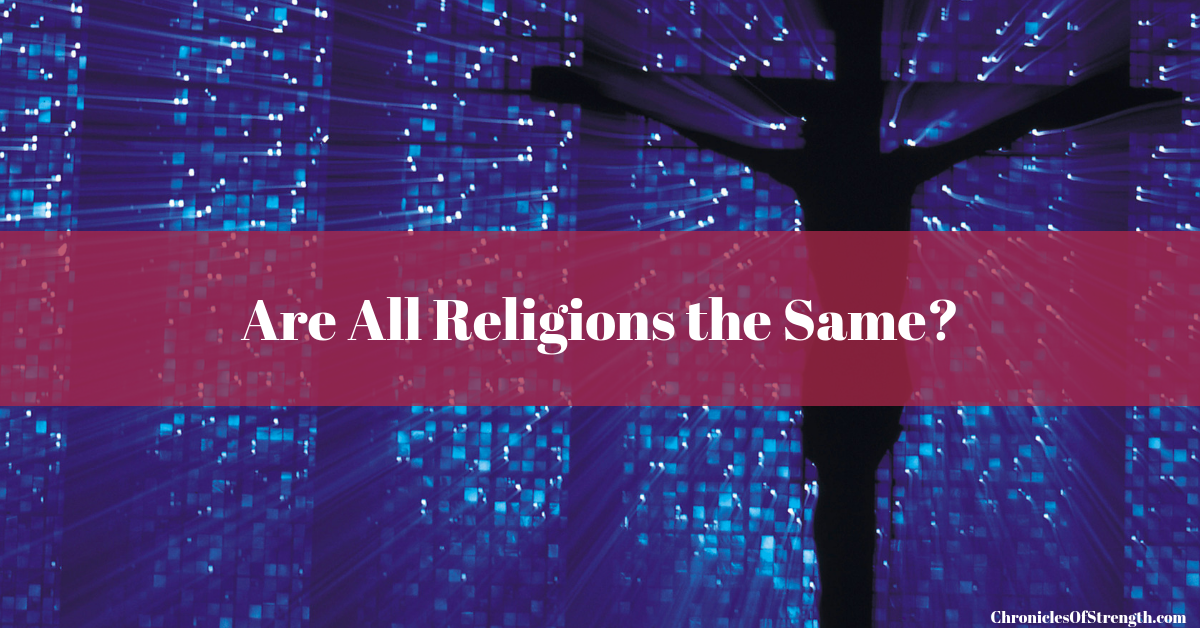
A comment from a previous blog reads: Isn’t all religion based on the same basic principles? Kindness towards others and an effort to better yourself on a quest for spiritual fulfillment? I’m no theologian, but I find it hard to believe that there are that many differences between the world’s major faiths. Sure, fundamentalists might be vastly different but what about moderates of all faiths?
My response:
Upon a superficial examination this may sometimes appear to be the case – that all religions are the same. But take only a few steps further into the matter and that assumption quickly detonates. The differences between the world religions, despite their points of pleasant, moral intersection (be kind to one another, don’t cling to worldly things, etc), are various and extreme. Some religions, as we know, believe in a transcendent God, others a pantheistic god or a plurality of smaller but still powerful beings, like Thor. Views on human afterlife, the meaning of human existence, etc—in other words, all the critically important stuff–diverge wildly between world religions. This leaves us with a fundamental dilemma: Either every religion is wrong, or at least one religion is true. But not all religions can be true.
Let me explicate the point. When I say that every religion is wrong, I don’t mean that atheism is true – that would be ridiculous. Been there, done that. It doesn’t work. I mean something more along the lines of a (sophisticated) religious pluralism: that all religions are pointing at something true but ultimately unknowable to us, and so, in a general sense all religions are right and wrong: right about a transcendent end for humanity, right about a spiritual dimension; wrong about the particular details each of them promote.
A book on that position that I quite recommend is the Perennial Philosophy by Aldous Huxley. Before I became Catholic – and after I was an atheist – that is what I held to. There is something of a Hindu modernism running through the spiritual thought of Huxley, and aside from Catholic-Christianity, I believe religious pluralism is the manliest and most sophisticated creed around.
But the argument against religious pluralism is, of course, the argument for Christianity, which is what eventually convinced me. I’ve been through this enough times that I won’t re-iterate it here (peruse the podcast and blog, perhaps starting here or here), but if you think a transcendent, moral God can be reasoned out and Christ and his resurrection supported historically and philosophically and theologically, then the door is shut on religious pluralism, because Christ did not teach religious pluralism. Christ taught that He was (and is) the way into heaven.
The Catholic position (or, in other words, my position) is this. Not every religion is wrong all the way through. In fact, many religions get a lot of things right. But there is a true north, so to speak – a definitive revelation from God that has given us the utmost clarity on who God is and how He wants us to have a relationship to him. And if that’s the case, then we should go with that, even, as it was for me, kicking and screaming.
– Pat
PS – Another problem with religious pluralism is this:
You need to know the right answer before you can say that all the other answers are wrong. The difficulty with religious pluralism is they say the right answer is that every religion is right in one sense, and wrong in another — but how do they know that? Because other religions claim the right answer is their answer, so it seems the religious pluralist could only make their case by having the real right answer and making arguments for it. But religious pluralists say the real right answer (the Godhead as he actually is) is inaccessible. This is like the person who says all religions are seeing only a part of the elephant but not the whole thing. But that assumes someone is seeing the whole of the elephant — that the real right answer is actually accessible, at least to someone — that someone has the full and correct point of view from which to judge the others as false or incomplete. But then that’s not religious pluralism. That’s just one specific right answer. In other words, the true religion. Carried through, it seems religious pluralism winds up being either vacuous or self-defeating.